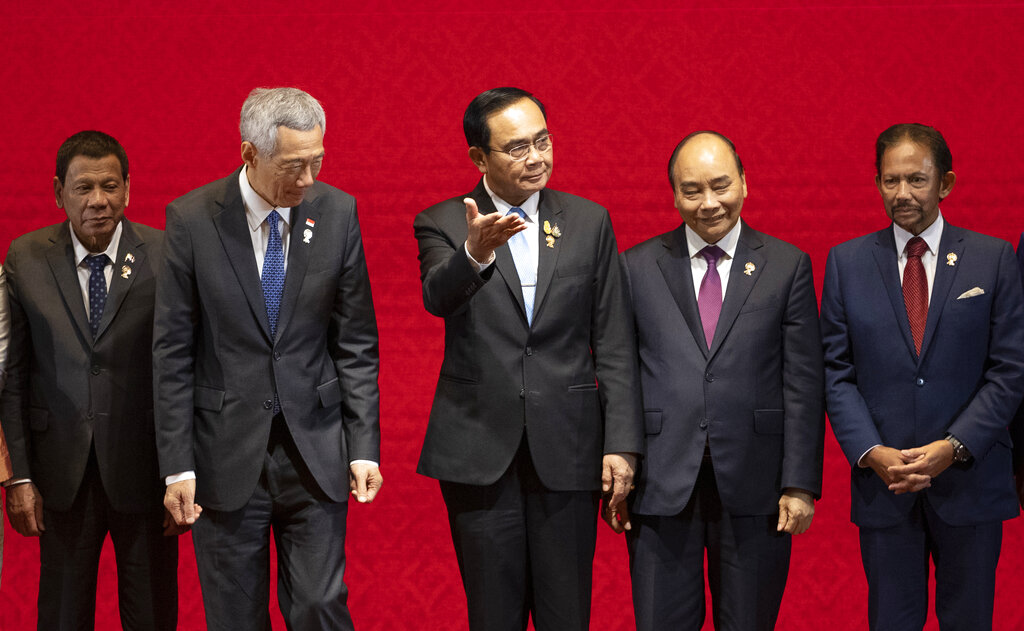
Photo: From left, Philippines President Rodrigo Duterte, Singaporean Prime Minister Lee Hsien Loong, Thailand Prime Minister Prayuth Chan-ocha, Vietnam Prime Minister Nguyen Xuan Phuc and Brunei Sultan Hassanal Bolkiah pose for a group photo during the opening ceremony of the 35th Association of Southeast Asian Nations (ASEAN) meeting in Nonthaburi, Thailand Sunday, Nov. 3, 2019.
Thai Prime Minister Prayuth Chan-ocha told fellow leaders the summit of the Association of Southeast Asian Nations should produce a basic agreement on their proposed Regional Comprehensive Economic Partnership, a 16-member trade bloc encompassing nearly a third of all global trade.
Prayuth said the aim was to have a final deal by next year. ASEAN also hopes to set a code of conduct with China regarding disputed waters in the South China Sea, he said.
President Donald Trump skipped the ASEAN summit and related meetings this year, opting to send his national security adviser, Robert O’Brien instead. Last year, Trump sent Vice President Mike Pence. This year both are busy campaigning back home and analysts say their absence will leave room for China to further raise its profile and clout in the region.
Chinese Premier Li Keqiang told other leaders attending that Beijing was committed to 10-nation ASEAN’s central role in the region.
“Given the complexity in the international and regional situation, our cooperation is built on a stable structure and moving forward in a positive fashion,” Li said. “This is beneficial to the region and all parties involved.”
“We support stability in the region and by doing so we have been able to cope with the instability elsewhere in the world,” Li said.
On the long-troublesome issue of the South China Sea, Li welcomed progress on negotiating a “code of conduct” aimed at taming aggressive actions that could set off armed confrontations in one of the world’s most disputed regions.
After being accused of delaying the start of talks for years while building artificial islands with military outposts on contested reefs, China agreed to commence negotiations and both sides announced that the first of three expected rounds was concluded in July.
Li called that progress “a very important landmark” for regional stability. He said China is committed to making headway in the negotiations with ASEAN members, four of whom — Brunei, Malaysia, the Philippines and Vietnam — are locked in the territorial disputes.
But the talks are highly contentious and it’s unclear if China is ready to sign a code that many governments, including the U.S., hope would be legally binding and potent enough to restrain provocative actions in a busy waterway crucial to global commerce.
Two Southeast Asian diplomats told The Associated Press that in a tense meeting in Vietnam recently, Vietnamese diplomats questioned how the negotiations could progress while flotillas of Chinese fishing boats backed by Beijing’s coast guard and navy were swarming into waters where Vietnam, the Philippines and Malaysia have exclusive rights under international law to exploit energy resources.
Chinese officials replied that ASEAN members should not allow one state “to hijack the COC process,” one of the diplomats said, referring to the code of conduct talks. The two diplomats spoke to the AP on condition of anonymity because of a lack of authority to discuss the issue publicly.
“China’s continued harassment of Malaysia, Filipino, and Vietnamese activities over the last year shows that it isn’t yet prepared to compromise in any substantive way. So these talks always seemed to be heading for trouble,” said Greg Poling, a South China Sea expert with the U.S.-based Asia Maritime Transparency Initiative.
On the issue of trade, ASEAN officials plan to present to the leaders a report on RCEP negotiations. A draft of a statement by the leaders on the RCEP seen by The Associated Press says talks should be finalized by February 2020 and endorsed by leaders of member countries at next year’s summit, which is due to take place in Vietnam.
“We are committed to sign the RCEP agreement in Vietnam in 2020,” the leaders’ draft statement said.
ASEAN members include Brunei, Cambodia, Indonesia, Laos, Myanmar, Malaysia, the Philippines, Singapore, Thailand and Vietnam. Together, they comprise a fast-growing regional market of nearly 650 million people.
The proposed RCEP trade bloc aims to dismantle trade barriers and set standards for trade between ASEAN and six other nations: China, Japan, India, Australia, New Zealand and South Korea. It does not include the United States.
 Weekly Bangla Mirror | Bangla Mirror, Bangladeshi news in UK, bangla mirror news
Weekly Bangla Mirror | Bangla Mirror, Bangladeshi news in UK, bangla mirror news







